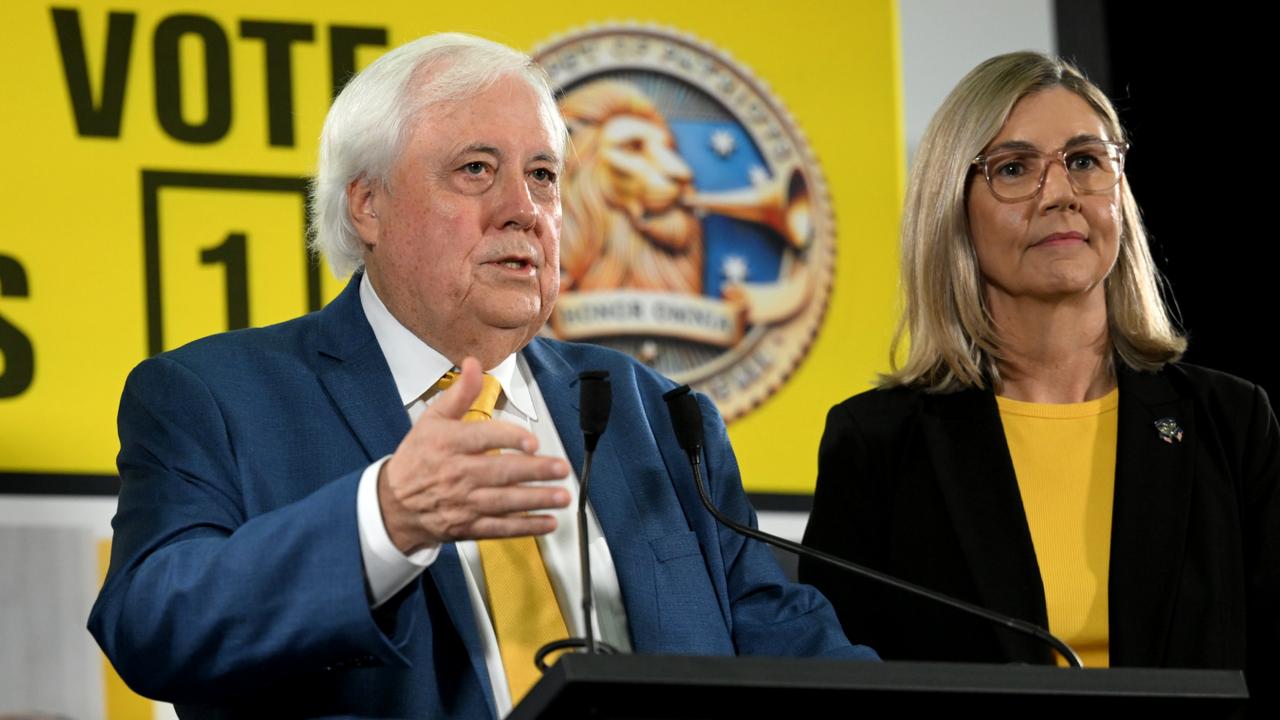Stop demonising profits or face economic pain, business leaders warn Labor
Business chiefs have launched a fightback against the demonisation of corporate profits and the Labor’s ‘anti-business’ policies.

Business chiefs have launched a fightback against the demonisation of corporate profits and the Albanese government’s “anti-business” policies, as Jim Chalmers this week unveils a key plank of Labor’s competition overhaul centred on sweeping merger reforms.
Amid flatlining economic growth, surging insolvencies and rising investment pressures, the Business Council of Australia and private sector leaders have warned jobs “aren’t safe” and that super fund investment could flow offshore if Labor continues on its current path.
The Treasurer will move to allay concerns of big business ahead of the May 14 budget by unveiling Australia’s biggest merger reforms in decades and dousing Coalition and Greens’ calls for divestiture laws targeting supermarket giants.
Former Labor minister Craig Emerson’s food and grocery code of conduct interim review, released on Monday, “does not support a forced divestiture power to address market power issues in the supermarket industry”.
The review recommends a mandatory code for supermarkets with annual revenues exceeding $5bn, including Coles, Woolworths, Aldi and wholesaler Metcash, and penalties of up to $10m, 10 per cent of a company’s annual turnover or three-times the benefit it gained from breaching rules.
Dr Chalmers on Wednesday will deliver the Bannerman Competition Lecture, hosted by the Australian Competition & Consumer Commission and Law Council of Australia, to announce the government’s merger reform plans. The Australian understands the merger reform plan, which the government believes will be welcomed by big business, is one of a suite of competition changes aimed at boosting economic dynamism that will be rolled out before the budget.
Despite attempts by Anthony Albanese to ease tensions with the private sector after telling a small business summit last week that his government was “pro-business”, the BCA is demanding stronger support for employers and private sector profitability from all sides of politics.
The pre-budget BCA campaign comes after industry groups and members cosied-up to Labor ahead of the 2022 election. Since the election, BCA members including BHP, Rio Tinto, Qantas, Woolworths, Coles, Woodside and Santos have been targeted by government industrial relations, energy and competition crackdowns.
Writing in The Australian, BCA chief executive Bran Black says corporate Australia “has become the national punching bag … we are dangerously close to making it taboo to run a business well and turn a profit”.
“Large businesses employ more than four million Australians – almost one-in-three workers. Those jobs matter. When you squeeze an employer, it is harder for them to operate, and at the end of the day jobs aren’t as safe,” Mr Black says.
“In an analysis from the RBA last year, it was shown that businesses with profit margins under 5 per cent had significantly worse employment outcomes. What that tells us should be common sense – you need decent, dependable profit to create and maintain secure jobs.”
With 80 per cent of the workforce employed in the private sector and $153bn being paid in company tax, the BCA warned the demonisation of profitable businesses was resulting in bad policies and putting the economy at risk.
Mr Black said Australia’s major supermarkets were “currently being investigated for price gouging when they are making less than 3c in every one dollar spent at the checkout”. “Do we want a situation where bureaucrats are setting profit margins for businesses or price controls for products? Thankfully the Prime Minister and Craig Emerson have pointed out this didn’t work for Soviet Russia. It certainly won’t work here,” he wrote.
In a joint statement, Dr Chalmers and Assistant Competition Minister Andrew Leigh said Dr Emerson’s food and grocery review “is all about making our supermarkets as competitive as they can be so Australians get the best prices possible”. “The interim report recommends the code be made mandatory, with heavy penalties for major breaches,” the statement said.
Since the ACCC in February outlined what business leaders described as a “radical” reshaping of merger rules, the Albanese government has consulted with the private sector to secure a middle ground. Company bosses want mergers to be processed faster and for new rules to consider the economic argument alongside regulation demands.
The ACCC in February said out of an estimated 1000-1500 mergers annually, only 330 were reported to it under the existing voluntary merger regime. Around half of mergers are made by the largest 1 per cent of businesses.

The competition watchdog has pushed for mandatory notification of mergers above certain thresholds and a requirement to not complete the transaction until approval is granted.
Former GWS Giants chair and BCA president Tony Shepherd, a NSW Racing director who has served on major company and public boards across Australia, said the welfare and wellbeing of the community relied on a strong economy driven by a profitable private sector.
“Some of the current latent socialist discussion misses this point. If the ecosystem of business small, medium or large aren’t doing well, that means jobs go, taxes aren’t paid and critical infrastructure such as roads, rail, schools and hospitals cannot be built,” he Shepherd said. “We should be celebrating and encouraging companies which are doing well and not be seeking to tear them down.”
Mr Shepherd, who chaired Tony Abbott’s national commission of audit, said “governments do not create wealth – they spend the revenue they take from hard-working people and business who pay so much in taxes and charges”.
NAB board member and former national KPMG chair Alison Kitchen said it would be a “travesty if the retirement savings of hardworking Australians are increasingly invested offshore” in the event commercial returns can’t be generated domestically.
“Business must be allowed to operate at a reasonable commercial return, it benefits us all,” Ms Kitchen said.
Ms Kitchen, who is a BCA director, said Australian businesses must be profitable to ensure workers can benefit through their super funds, which are “generating an enormous pool of investment funds which will allow people to live in greater comfort in their retirement”. “Professionals manage those funds to generate the best returns for their customers,” she said.
BCA president and former Sydney Airport chief executive Geoff Culbert said “when businesses succeed, our whole country succeeds”. “We need companies to do more than break even. We need companies to grow to keep jobs and create jobs. I worked for a US company for 15 years and I was always fascinated by the difference in culture between the US and Australia,” he said.
“In the US they celebrate their successful companies and hold them up as icons to be admired. It creates an aspirational environment that promotes innovation and growth. There’s a lot that Australia does better than the US, but it’s no coincidence that the US consistently produces the world’s most innovative and successful companies.”
Council of Small Business Organisations Australia chief executive Luke Achterstraat said “we need to see real action – not just talk – and better recognition of the unique operating environment facing small business”.
“Without meaningful action to address rising energy costs and slowing productivity, we face the alarming prospect of sustained small business closures. Whilst small and big business won’t agree on everything, there are many common areas to work together to lift the tide for all boats such as improving our IR system,” Mr Achterstraat said.
“Let’s nurture rather than neglect, or worse yet, demonise Australia’s job creators.”








To join the conversation, please log in. Don't have an account? Register
Join the conversation, you are commenting as Logout